Do you spend the month of January looking around your house asking, “What can I do with all this stuff?”
After all the Christmas packages have been unwrapped and put away, the ornaments nestled safely back in the attic, and the tree stored or sent off to the chipper — many of us feel overwhelmed at the task of organizing. RE-ORGANIZING.
This is the year for you (and me!) to make some big changes. Instead of heading to the store to buy more storage boxes, why not pare down our stuff and simplify?
I was thrilled to be contacted by author Kathryn Porter, who is offering some advice for us overwhelmed moms. A former clutterbug, she’s now a professional organizer and popular speaker who shares her faith-based message on how to keep a clean house. You can read more about her at her website, Clutterwise.

Kathryn, can you tell us how you define clutter?
Clutter is anything that does not enhance our homes or enrich our lives. Sometimes we think when something is expensive that it’s enriching, but that’s not always the case.
What do you suggest we do first if we’re feeling completely overwhelmed by our clutter and don’t know where to start?
When you don’t know where to start, start with the easy stuff:
• Is there trash around the house that missed the garbage pail?
• Are there clothes with holes, stains, or in otherwise disrepair?
• Is there junk mail, expired coupons, or old newspapers laying around?
How can we stop clutter from coming into our homes?
I’m glad you asked this question. This is an essential component to maintaining a presentable home. Anyone can de-clutter a room, but how do we keep the clutter from coming back?
It requires a lifestyle change that starts with establishing boundaries. Learning to say no is probably the number one boundary issue when it comes to clutter. It’s hard to say no to sales at department stores, unwanted gifts, and helping a friend by storing their extra couch.
Even too much stuff on our calendars can end up cluttering our homes. We have less time to clean, while at the same time we’re accumulating more stuff from all the activities we’re involved in. I talk about this in my book, but here are some examples of how to set boundaries in order to keep the clutter at bay:
Boundaries with books:
How many books do you own? Do you have boxes stacked on your closet floors without a home? Limit the number of books you own to what comfortably fits into your bookcase.
Boundaries with people:
Are you storing other people’s stuff? Stop opening your home as a storage facility for friends and family. Let them deal with their own clutter so you can effectively deal with yours. Also, be careful about borrowing other people’s stuff, particularly if you have a tendency to forget to return things.
Boundaries with giving:
Do you go overboard for birthdays, Christmas, and other special occasions? Simplify your giving habits. Instead of buying Christmas gifts in January that you have to store all year long, wait until October for purchasing holiday presents. Consider giving gifts that don’t cause clutter such as treating someone to dinner, a movie, or play.
These are all great ideas! Kathryn, do you think it’s possible to live clutter-free?
I don’t think it’s possible to live completely clutter free because we constantly create more everyday. If it’s not of our own doing, then it comes in our mailbox or as a well-intentioned gift. The goal is to create a home that’s both functional and attractive, while minimizing the clutter.
Do you have any suggestions for mothers who are constantly dealing with the in-flow of papers — from kids’ schoolwork, teachers’ notes, birthday party invitations, newspapers, magazines, thank-you notes, grocery lists, notes-to-self. HELP! I speak from experience, unfortunately.
I could talk about paper for an hour and still have more to say so I’ll try to keep it simple. When it comes to a house drowning in paper, here are a few things you can do to plug the holes that let the paper in, while controlling what’s already there:
1) Take your name off mailing lists. If you don’t see the sales ads, you won’t be as tempted to buy more stuff.
2) Cancel unnecessary magazine and newspaper subscriptions. You won’t feel obligated to read them if they’re not coming through your door, nor will they create extra trash for you to toss.
3) Consolidate bank accounts. The simpler your money management routines, the less paper it will require.
4) Cancel credit cards. We tend to buy more using plastic because hard-earned cash in hand hurts us a little more when we spend it.
5) Use electronic bill paying. Be careful when giving out account information and be sure to track the debits, but this is a popular option to make life easier.
6) Implement a calendar system to track appointments. Limit memos and sticky notes by having a central location in which to record activities.
7) Create guidelines for keeping children’s schoolwork and stick to them. Create standards such as keeping only the best work or assignments that require creativity such as writing or artwork.
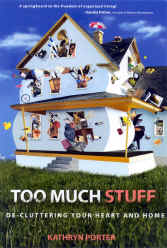
Can you tell us about your book? Who would most benefit from reading it?
Anyone who feels overwhelmed by clutter would benefit from my book. I write from the trenches.
It’s not just about another method to get organized. The focus really is on helping people determine what’s meaningful and what’s clutter, but there’s lots of organizing tips too.
I’ve also heard from readers who are self-described neat freaks telling me they appreciate my book because it’s helped them understand friends and family with messy tendencies. I even had one woman come up to me after a speaking engagement who said that she never considered herself a packrat until she heard my story. I’m learning that a lot of people think the way I used to think: “It’s not clutter! It’s just my stuff and my stuff needs a home!”
Do you have any closing bits of advice for the woman who feels like she’ll never emerge from her chaotic home in one piece?
Never give up. De-cluttering is a process, so enjoy the journey. There may be times when setbacks occur, but they won’t undo the amazing strides forward.
I also want to encourage people to embrace de-cluttering as a fun and positive activity. It’s a beautiful thing when we let go of the possessions that steal our hearts so we can focus on the people who matter to us and become more aware of God’s blessings in our lives.
Kathryn Porter is an expert at teaching parents how to get their kids to help around the house. Check out her article here at Focus on Your Child. If you’re in need of some more encouragement, you can learn about workshops and resources availabe by visiting Clutterwise.








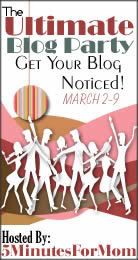
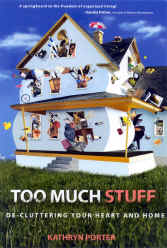


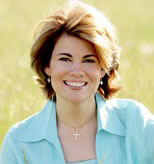
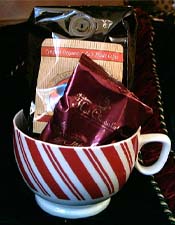
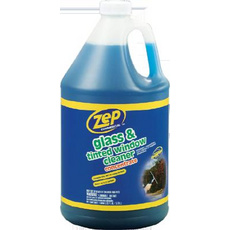 Where has Zep been all my life? I’m actually enjoying cleaning windows. In fact, I have no time to blog because I’m too busy swishing dirt and fingerprints off my windows with my new best friend:
Where has Zep been all my life? I’m actually enjoying cleaning windows. In fact, I have no time to blog because I’m too busy swishing dirt and fingerprints off my windows with my new best friend: 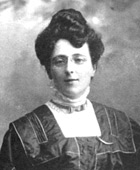 Today is Lucy Maud Montogomery’s birthday, and I’ve been wanting to sit down and blog about her all day — but I’m just too tired!
Today is Lucy Maud Montogomery’s birthday, and I’ve been wanting to sit down and blog about her all day — but I’m just too tired!